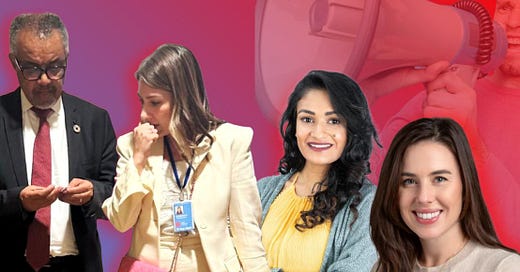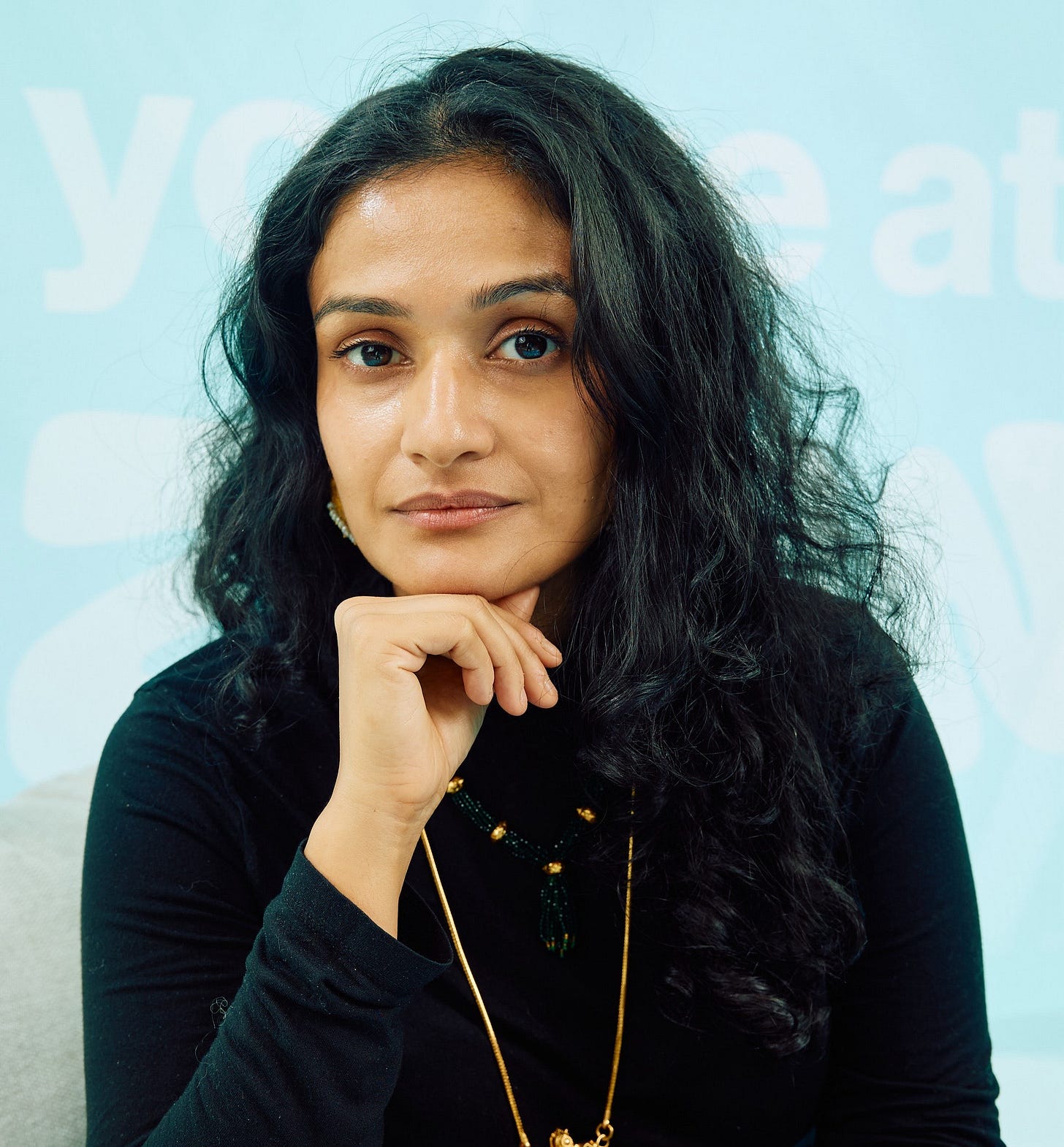Part 5 — What are the digital trends for politics and diplomacy?
2025 is going to be an exciting year for technology, social media, digital marketing at the intersection of communities, advocacy, politics, and diplomacy!
💬 Quick CONVERSATION STARTERS:
“The creator network is vast. Partner with people/brands that authentically share your values”
“The gap between voters and legislators will shrink, fostering more direct, meaningful connections”
When we started this 2025 digital and tech trends series, we didn’t know it was going to expand to 5 installments — and counting! We’ve spoken so far with a dozen of inspiring experts and leaders in the digital and tech sectors, providing us with key takeaways and trends to look for in 2025.
With this Part 5, we’re adding invaluable contributions from experts like Aleksandra Kuzmanovic at the World Health Organization (WHO), Bhumika Regmi at Malala Fund, and Aubrey Ottenstein at Hilltop.
Don’t miss Part 1 and Part 2 and Part 3 and Part 4, with insights from
, Dan Morrison, and Patricia Gruver-Barr, , , Marco Ricorda, Stéphanie Fillion, Roxy Ndebumadu, Gerry Diaz Bartolome, Anja Gabriel, and .More is coming soon… So stay tuned!
Today’s quote:
“The interest in Substack has been crescendoing since the beginning of the year, and the brands are starting to wise up.”
—
Aleksandra Kuzmanovic: “Social media's true power lies in connection”
* Aleksandra Kuzmanovic is the Leadership Social Media Manager at the World Health Organization (WHO). She advises WHO Director-General Tedros Adhanom Ghebreyesus and the WHO senior leadership on social media activities — how to effectively communicate and engage with diverse audiences on critical health issues.
1) What do you love about your job and what do you see as the biggest challenges?
Social media is a powerful tool for public health, allowing us to share health information instantly to millions of people. I love this job, because with every click we increase the chance of helping someone to make a better choice about their health. But with great reach comes great responsibility. Incorrect information can harm lives, so accuracy is paramount. And while accuracy is our top priority, keeping up with the fast-paced flow of information feels like a constant sprint.
2) What is the best advice your boss Dr Tedros gave you? What is the best advice you gave him?
The social media environment is not always pleasant. Dr Tedros taught me something crucial about it: focus on the work, not the negativity we encounter on social media. He always emphasizes the importance of addressing challenges objectively rather than taking criticism personally and reacting to it emotionally. Being calm in the toughest moments is one of his biggest strengths.
My advice to him — to diversify both platform use and content style. Social media is fluid, and depending on a single platform can be limiting and risky. Tailoring content tone to specific audience segments is also critical. We're putting more effort into accessibility and weaving in personal stories to deepen connection with the public.

3) What are your predictions for digital diplomacy next year and beyond?
Digital diplomacy often focuses on broadcasting updates, but social media's true power lies in connection. To build trust in digital diplomacy, we must engage with our audience more and more, not just inform them about our decisions or whereabouts. Transparency is not enough.
Bhumika Regmi: “The creator network is vast. Partner with people/brands that authentically share your values”
* Bhumika Regmi is an award-winning creative leader with more than a decade of experience building meaningful communications and digital strategies, advocacy and fundraising campaigns and visibility-building content for entities around the world. Right now, Bhumika leads a team responsible for bringing Malala Fund's storytelling and campaigns to life through digital, editorial, production and content creation efforts. In her work, Bhumika is most passionate about helping brands and organizations build towards growth in a meaningful way. As a leader, she cares most about fostering a collaborative team culture built on creative freedom, trust and transparency.
1) What do you love about your job and what do you see as the biggest challenges?
I love crafting strategies that amplify impactful stories, connect with diverse audiences, and drive meaningful change. Helping organizations elevate underrepresented voices and advocate for equity has been deeply fulfilling. And being able to do storytelling in creative, thoughtful ways that actually resonate with target audiences and cut through the noise is exciting — I love that I don't have to limit myself or my team to churn out tired messages or content just for the sake of volume.
The biggest challenge is navigating a fast-evolving media and political landscape — balancing the need for quick responses to global crises with maintaining long-term, brand-aligned messaging that resonates across varied audiences. When the nature of your organization calls for agility and reactiveness to current events, it can be difficult to maintain brand consistency and avoid isolating different audiences. It's part of the job but definitely a challenge.
2) What's your best advice to survive the current juncture in the social media world with too many platforms to focus on, a massive exodus from X, and an ever growing creator economy?
Prioritize authenticity and aligning with your brand's purpose. Instead of stretching across all platforms, meet your audience where they are most engaged. For example, if your goals include influencing a target audience like policymakers as well as engaging a wider audience, identify platforms that best serve each goal and tailor strategies accordingly. Always center decisions on your brand's north star — including when assessing X's viability. Ask: Does staying harm your mission or reputation? Does it still reach key audiences? Do the benefits outweigh the cost or vice-versa? What direction best serves your north star?
Some bonus advice: The creator network is vast. Partner with people/brands that authentically share your values. Your audience is perceptive — they will see through forced engagements and celebrate genuine ones.
3) What are your predictions for social media and digital diplomacy next year and beyond?
Right now, people are concerned about the spread of misinformation and toxic online environments. There is also a collective sense of overwhelm and content fatigue. And further exacerbating these issues, the rise of AI in content creation could mean more volume and over-saturated platforms.
Because of these trends, I think social media users will eventually gravitate towards spaces where they feel a strong sense of trust and community, where content is curated and less generic and quality is prioritized over quantity. And as a reaction to this, creators and brands will aim to be more focused, fostering deeper connections and meaningful engagement among users who share common values, passions, or goals, instead of producing content that has mass-market appeal. With audiences wanting to "detox" or slow down social media consumption, we might also see an uptick in static content that is easier to digest. To share one example, this could look like brands putting more effort on curated, informational carousel posts and being less dependent on video creation.
In digital diplomacy and advocacy, my hope is that short-form storytelling dominates and key players find creative ways to demystify complex issues and combine data visualization and real-world stories to foster audience trust and engagement.
Aubrey Ottenstein: “The gap between voters and legislators will shrink, fostering more direct, meaningful connections”
* Aubrey Ottenstein is the founder and CEO of Hilltop, a company that breaks down barriers in civic engagement by providing citizens with a direct line to their lawmakers. Featured in Vogue for her efforts in evacuating at-risk activists from Afghanistan, she is also the co-founder of Globally, a nonprofit that unites emerging leaders around strategic national security and foreign policy goals. Previously, Aubrey built the U.S. Institute of Peace’s Youth, Peace, and Security Portfolio, where she launched the first YPS Fund. She also worked with ACCION International’s $73M impact investment fund. Aubrey lives in Washington, D.C., with her husband and three children.
1) What are your key takeaways so far in your experience as a tech founder and advocacy leader at the intersection of government and technology?
There is a clear gap in technological innovation in constituent relations and a palpable need for modern solutions in this space. What's encouraging, however, is the growing openness from Capitol Hill — staffers and offices are actively seeking new tech tools and are eager to bring constituent engagement into the 21st century. This presents a unique opportunity to not only modernize how lawmakers connect with their constituents but also to drive more effective, transparent, and accountable government. Hilltop's current task is to align the required capital to solve this challenge and scale these solutions to truly transform the civic engagement landscape.
2) How can we leverage tech and AI to help voters better participate in the discussions about the policies that impact their communities?
At Hilltop, we’re leveraging AI to bridge the knowledge gap between everyday Americans and legislative offices, making it easier for voters to engage in policy discussions. For example, we give voters three simple prompts to help them craft personalized submissions while AI seamlessly connects their concerns to relevant policies and bills. This approach meets voters where they are while also equipping legislative offices with valuable, actionable data. We're making civic engagement more accessible, impactful, and data-driven for both voters and lawmakers.
3) Your predictions for the role of tech, politics, and diplomacy in 2025 and beyond?
I believe that technology, politics, and diplomacy will become even more interconnected, transforming how governments engage with citizens. As the government continues to evolve and innovate, the gap between voters and legislators will shrink, fostering more direct, meaningful connections. Hilltop hypothesizes that if we make civic participation more convenient and provide legislative offices with better voter sentiment data, we can drive more representative policy-making and help restore trust in government.








